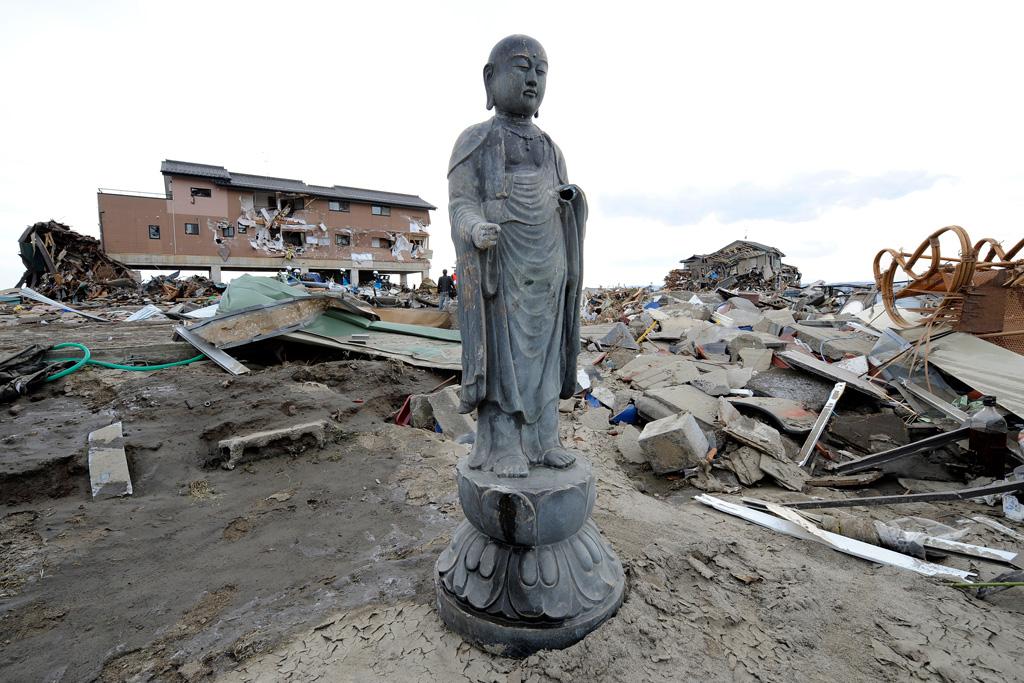Opinion: “Tsunami” is a Japanese word
A religious statue stands amongst debris in a tsunami-devastated area close to the sea front, in Natori, Miyagi Prefecture, on March 14, 2011.
BOSTON — Ian Buruma of Bard College, a man with deep knowledge of Japanese culture, has pointed out that the idea of impermanence is ingrained into the Japanese psyche.
So accustomed to earthquakes are the Japanese that they traditionally built their towns of wood and paper that flex with the quakes. These were never meant to last for the ages like the marble temples of ancient Greece or the stone cathedrals of medieval Europe. Their most sacred shrine may be 1,500 years old, but it is torn down and rebuilt every 20 years. And of course “tsunami” is a Japanese word.
The island nation’s oldest religion, Shinto, was originally a way to appease the gods in the face of natural disasters, and when Buddhism arrived, with its ideas of the impermanence of existence and constant rebirth, the new doctrine fell on sympathetic ears.
World War II, with not just atomic bombs, but the fire-bombings of Japanese cities as well, also contributed to their sense of fatalism and impermanence. A city that was here yesterday can be gone tomorrow.
Buruma, writing in the Wall Street Journal, points out that the Godzilla movies, the original mass destruction films, play to this theme. Godzilla was created by an American hydrogen bomb test in the Pacific, and comes as a mutant monster to destroy Tokyo. That Japan should now be invested with not only natural disaster, but nuclear contamination is irony at its tragic heights. But the Japanese, of fact and fiction, have always picked themselves up and rebuilt their cities and towns.
Tsunamis and earthquakes have helped forge the national character, a Japanese sense of community and what Buruma calls “calm resilience.” It is the belief that anything knocked down can, and will, be quickly put back up again.
It reminded me of something that former Coast Guard officer and author Stephen Flynn wrote while at the Council on Foreign Relations. His thesis was that the best defense against terrorism in the age of weapons of mass destruction is resilience. How fast we can shrug off a mass attack and get back to a semblance of normality is the key, not only for a terrorist attack, Flynn said, but for a natural disaster as well. The more we can prepare ourselves to recover from something terrible, be it natural disaster or something man-made, the stronger our nation and society will be.
For example, Flynn suggested that if we have stadiums and auditoriums prepared to take in a rapid influx of survivors, the better will be our response, whether it be to a hurricane, an earthquake or a terrorist attack.
This country has been both vigilant and fortunate to have avoided a second 9/11. But the chances are another “big one” will slip through our defenses. No country can guard against every eventuality. One might also add that resilience also means not over-reacting. George W. Bush’s taking advantage of 9/11 to attack Iraq was similar to what World War II might have looked like if Franklin Roosevelt had invaded Brazil in response to Pearl Harbor.
It is also likely that we will have a major earthquake in California or the Pacific Northwest. The great shifting Pacific plate has caused a big one in the northwest now in Japan, which was proceeded by a huge earthquake and tsunami in the southwest off Sumatra, and similar giant in Chile. Only the northeast quadrant of the Pacific rim remains.
Resilience is the key. And, consequentially, the quicker we recover from a terrorist attack, the less attractive we become a target for terrorism. There is not much satisfaction hitting a man who picks himself up and goes on with his business rather than crying in rubble.
Flynn mentioned to me the example of the British, who were very good at picking up the dead and wounded, sweeping up the broken glass, and going about their normal routine in quick order. But he might also have mentioned the Japanese. Chances are that the Japanese will show us a thing or two about resilience in the months and years ahead, in the wake of their three-headed disaster at the hands of the classic elements, first earth, then water, and then fire in their nuclear facilities.
Every day, reporters and producers at The World are hard at work bringing you human-centered news from across the globe. But we can’t do it without you. We need your support to ensure we can continue this work for another year.
Make a gift today, and you’ll help us unlock a matching gift of $67,000!
